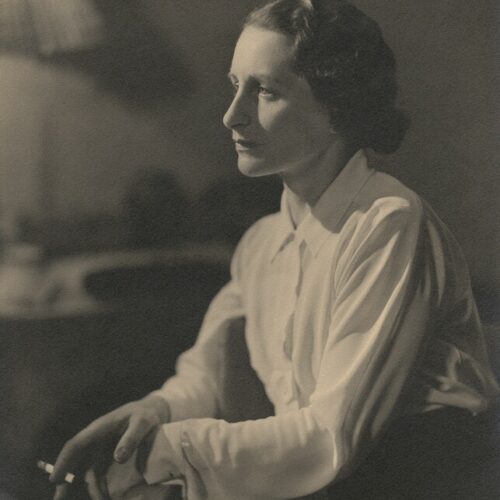

I think that one of the most hopeful signs at the present day, and one for which this Movement can take very great credit, is the gradual weakening of the power of superstition…
Born in Newcastle under Lyme in 1893, by the time of this toast Vera Brittain was a well-known feminist, pacifist, and writer. A lifelong advocate of peace – to which she makes reference in this speech – she would go on to become chair of the Peace Pledge Union, an active member of the Campaign for Nuclear Disarmament, and a supporter of the Committee of 100. Both Brittain and her husband, the political scientist George Catlin, also spoke at Conway Hall.
In this toast, delivered at the annual dinner of the Rationalist Press Association in May 1935, Brittain highlights the significant role of the humanist movement in helping to further the rights of women. She also points to the dangers of superstitious thinking, and of ascribing to fate what should be under human control.
The below, from ‘The R.P.A. Annual Dinner and Reunion’, The Literary Guide (now New Humanist), July 1935, is reproduced with permission.
Miss Vera Brittain, in proposing the Toast, said ‘My Lord Chairman, Ladies and Gentlemen, I must confess myself extremely flattered at being told (what I did not know until I came into this room) that I am the first woman to be asked to perform the very pleasant duty that I have to do to-night. As the occasion, from the point of view of my sex, is evidently such a momentous one, although I do not want to dwell overmuch on the position of women (because I spoke on that subject at the Conway Hall Discussion Circle), I nevertheless feel that it would be ungracious in me to let the occasion pass (especially as at this moment we are all of us rather concerned in reviewing the progress of certain Movements) without saying a word of gratitude for what I do very strongly feel that this Movement has done to further the progress of women during the past thirty years.
Because of such Movements as yours the world, although it is not yet an ideal place for women, has at least become a tolerable one.
Charles Kingsley once said “There will never be a good world for women until the Canon law is civilized off the earth”—(Hear, hear)—and in that civilizing process your Movement and your Association have helped beyond description, for (as Mr. Bertrand Russell and others have unceasingly pointed out) the subordination of women has been part of that basis of theology upon which the Churches of this country have been established. Because of such Movements as yours the world, although it is not yet an ideal place for women, has at least become a tolerable one. We still have to fight in order to be allowed to contribute something valuable to the civilization of which we are a part; but if we do fight we are nowadays sometimes graciously permitted to be of service to our day and generation. We are no longer told, as were the women doctors who volunteered for service in the army at the beginning of the Great War, that all that was required of women was to go home and keep quiet.
I think that it is difficult to estimate how much the Women’s Movement owes to such publications as your famous Cheap Reprints and to the volumes of the Thinker’s Library… I think that there is no limit to what those publications have done to undermine the power of superstition; and it is, of course, upon superstitions, prejudices, assumptions, and fallacies of all kinds that the idea of the subjection of women has been based.
I think that it is difficult to estimate how much the Women’s Movement owes to such publications as your famous Cheap Reprints and to the volumes of the Thinker’s Library, which have not only been read but bought—a very different thing—in their hundreds of thousands. I think that there is no limit to what those publications have done to undermine the power of superstition; and it is, of course, upon superstitions, prejudices, assumptions, and fallacies of all kinds that the idea of the subjection of women has been based. The whole superstition of woman’s uncleanness and her menacing magical powers do not seem to me really so very different from the more modern superstition, that a woman’s mind works by some mysterious process known as intuition or instinct. I remember Mr. Baldwin once giving expression to that superstition on a rather inappropriate occasion, when he appeared at the great women’s meeting at the Queen’s Hall in 1928 to announce that votes were to be given to women on the same terms as men. He prefaced that welcome announcement by the remark: “I would rather trust to a woman’s instinct than to a man’s reason.” (Laughter. ) I do not quite know what instinct of this type is, although I am sure that it is very valuable. If only I could write my books or prepare my lectures by instinct, I feel that my income from royalties and fees would be a good deal higher than it is at the moment.
Of course this ascendancy of passion and superstition in the civilizations of the world has been responsible for many other catastrophes besides the subjection of one half of the human race to the other. It has been, and still is, responsible for the fact that the nations are now again preparing for war, although the statesmen liable, within their own lifetime, have seen the flower of a generation disappear into the earth or under the sea. They know, as the evidence of the last war proved, that another one would mean the death of society, and yet they still allow themselves to be driven by those blind forces which persuade people to act before they think, or indeed, apparently, to act without thinking at all. Superstition and tradition are again responsible for the readiness with which even educated people are prepared nowadays, and always have been, to spend money upon the means of destruction rather than upon the things that make for a better life—(Hear, hear)—in a sort of vague hope that some kind of safety and security is going to result from that extraordinarily irrational process.
If only we can keep this salutary flame burning during this period of our darkness, I believe that one day it will eventually blaze up until it lights the obscure corners of people’s minds, so that they no longer “see as through a glass darkly,” but with the clear light of reason and human intelligence.
I sometimes feel that it is due to nothing more rational than the old superstitious belief in the God of Battles, who was always being summoned to arise and let his enemies be scattered as though that was not already his chief occupation, that we still spend as a nation more money on battleships than on houses, on aircraft than on education, and on the material for bombardments rather than on the rescue of mothers from death in child-birth. I believe that it is a fact—I verified it from Mr. Arthur Greenwood himself—that for the fifty-two millions that were spent upon the three preliminary bombardments of Arras, Messines, and Passchendaele during the War we could have had a national maternity service, with all that it would have meant in the reduction of maternal mortality, for a period of nearly twenty years. So we have not got a rational nation or a rational universe just yet; but the fact, does remain that the Rationalist Movement, the Rationalist Press Association, is one of our few remaining defences in the reactionary present against those conventions that cripple our lives and those blind and passionate follies that threaten to destroy them. If only we can keep this salutary flame burning during this period of our darkness, I believe that one day it will eventually blaze up until it lights the obscure corners of people’s minds, so that they no longer “see as through a glass darkly,” but with the clear light of reason and human intelligence.
I think that one of the most hopeful signs at the present day, and one for which this Movement can take very great credit, is the gradual weakening of the power of superstition owing to the popularization of science, and to the way in which people are taking much more interest in scientific books. Superstition is a very hard thing to fight, because very often it has some sort of rational basis in precautionary measures which at the beginning had reason behind them. Take, for instance, a very small and a very common superstition – that against lighting three cigarettes with one match. I understand (although there are people here to-night who are better qualified to say whether I am right or wrong) that this superstition originated during the War from the fact that, if a sniper was watching, it was possible for him to get the range only by the time that the third cigarette was lighted, and therefore the person who lit the third one was peculiarly unlucky. I do not know whether that is true or not, but if it is it does illustrate the way in which small superstitions (and, of course, much greater ones) are due to a certain set of precautionary measures having outlived their origin, so that people act in the way that they do without knowing why they act in that way, which leads to a belief in supernatural powers.
I think that one of the most hopeful signs at the present day, and one for which this Movement can take very great credit, is the gradual weakening of the power of superstition owing to the popularization of science, and to the way in which people are taking much more interest in scientific books.
One of these beliefs, I suppose (more common than most of us in this room would be prepared to admit perhaps), is the belief in a sort of over-mastering fate or destiny, which decides what is going to happen to us quite independently of our reason or our actions. I remember very well being on a transport ship in the Eastern Mediterranean in the autumn of 1916, part of a convoy of nurses being moved from Mudros to Malta, and, by one of the characteristic muddles of our administration at that time, the unfortunate ship was made to carry about twice as many people as it was really built to hold. In consequence of that some of the youngest of us were herded down into the hold, rather like cattle, instead of the comparatively useful people that some of us were, and if we had by any chance been caught by a torpedo in that place, where submarines were extremely numerous, there would not have been much chance of more than about ten per cent of us petting up the ladder-like staircase that led to the upper decks. I remarked to a companion of mine: “Our chances of escape are not anything to write home about if a torpedo does get us.” My companion shrugged her shoulders and said: “If a torpedo is going to get us it will get us. It is just fate.”
Epidemics and wars, the death of women in child-birth— these things are not fate; they are the result of the breakdown of human reason, of the failure of statesmen to take proper precautionary measures, and so forth. They are not just chance; they are due to reason not being used when it might have been used, and people are the victims of that failure of the human mind to function.
I suggest that if a torpedo had got us and we had all been drowned, and I had not been able to come here to-night, it would not have been fate at all; it would have been human muddle, human incompetence, and lack of human reason that was the cause of that particular catastrophe. It used to be held that an early death was just fate: “his time had come” people used to say. Epidemics and wars, the death of women in child-birth— these things are not fate; they are the result of the breakdown of human reason, of the failure of statesmen to take proper precautionary measures, and so forth. They are not just chance; they are due to reason not being used when it might have been used, and people are the victims of that failure of the human mind to function. I suppose that nowhere so clearly as in modern medicine are we seeing the change from a condition in which circumstances control us to one in which man is becoming the master of his fate. In fact, the whole progress of civilization is really the story of man’s conquest of his fate, of the gradual reduction of the area of experience in which the will and the intelligence are not yet able to operate. We have already advanced so far that we have no reason to doubt that the forces which are still mysterious to us will one day be understood by the human mind and controlled by the human will, and in that advance the Rationalist Movement has played, and will continue to play, an important part.
It is my pleasant duty to conclude by proposing the Toast of “Prosperity to the Rationalist Press Association,” at a time when, I am informed, the membership is the largest recorded in any year. I understand that it amounts to 4,374. (Applause.) Last year, in performing a similar duty, Professor J. B. S. Haldane questioned how long the life of this Association was going to be, owing to the fact that the Incitement to Disaffection Bill, popularly known as the Sedition Bill, was then before Parliament. We now have on our Statute Book that astonishing example of bad law, which is primarily directed against persons like myself, who might by some chance be guilty of causing a soldier to think; and we know that, in spite of various amendments made to this Act, it is capable of being used in a menacing way, at a time of crisis, against anyone who may find himself or herself “agin” the Government. I imagine that in this room there are a good many people who have found themselves, and who are likely to find themselves, “agin” the Government at some particular time –(Hear, hear)–and whatever particular Government we may have.
Earlier this week I was present at a Jubilee Dinner held by the Women’s Freedom League to commemorate the advance made by women during the past twenty-five years. One of the speeches at that Dinner was made by Miss Lilian Barker, the new Assistant Commissioner of Prisons. Miss Barker then said that if a new militant movement was necessary to maintain the progress that women had won, during a period of reaction such as the present, she would be very glad to offer the hospitality of the premises for which she was responsible to anyone who took part in that Movement. (Laughter.) I am quite sure that all those who are associated with the Rationalist Movement would prefer to enjoy the type of hospitality that Miss Barker offered on that occasion than to abandon the great human principles by which our fathers and our mothers have helped to liberate us from tradition and superstition, and which were never more needed than they are to-day.
“What now? What comes after?”… there is still time for a favourable reply to that question, and it is in the belief that those who are in this room to-night both can and will help our country to give that favourable answer that I propose the Toast, “Prosperity to the Rationalist Press Association.”
I do not think that it is possible to exaggerate the gravity of the crisis with which we are faced. From the point of view of the Government, the Silver Jubilee has very conveniently diverted the attention of a good many people from our present discontents. (Hear, hear.) The most trenchant comment on this was one that I saw yesterday when I happened to be walking in the World’s End district of Chelsea, which will be known to some of you, I think. There I saw chalked on the walls of those poor homes the words: “Flags to-day; gas masks to-morrow.” That seemed to me to be the best comment on the situation that I had seen yet. No decorations, no gatherings of Captains and Kings, no reminders that the British Empire holds dominion over palm and pine and many other kinds of arboreal specimen, can prevent intelligent people from asking the question to-day: “What now? What comes after?” But dark as the outlook is, there is still time for a favourable reply to that question, and it is in the belief that those who are in this room to-night both can and will help our country to give that favourable answer that I propose the Toast, “Prosperity to the Rationalist Press Association.” (Applause.)

The British Museum is a museum of human history and culture in London. Its collections include objects of humanist heritage […]

As for Mother Clap, she was present all the Time, except when she went out to fetch Liquors… The Company […]

It is a principle innate and co-natural to every man to have an insatiable inclination to the truth and to […]

Prior’s Field School was founded in 1902 by Julia Arnold Huxley. Born in 1862, Julia grew up in an intellectual […]